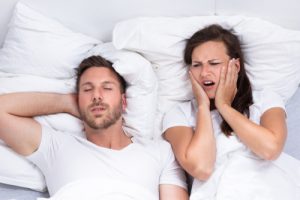Posted on Tuesday, October 16th, 2018 at 4:09 pm

Sleep apnea can be a serious sleep disorder that commonly causes snoring. Not all sleep apnea cases involve snoring though.
Certain types of people can be more susceptible to sleep apnea depending on their anatomy or living conditions. In some cases, sleep apnea may be overcome through simple lifestyle changes but other cases may require medical devices or surgery.
The Different Types of Sleep Apnea
Sleep apnea generally comes in three different forms. The most common form of sleep apnea is obstructive sleep apnea (OSA), which involves blockage of a person’s airway.
Central sleep apnea, on the other hand, involves a person’s brain not sending the right signals to muscles that regulate breathing. Complex sleep apnea syndrome involves a person who has both OSA and central sleep apnea.
Sleep apnea can affect people of all ages, including children. People may be more likely to suffer from sleep apnea if they are male, overweight, or over 40 years of age. Other possible causes might include people simply having large necks, tonsils, or tongues, gastroesophageal reflux disease (GERD), or family histories of sleep apnea.
Possible Signs of Sleep Apnea
Most people exhibit one or more signs that they are suffering from sleep apnea. Certain symptoms are easier to identify than others.
In general, some of the most common signs of sleep apnea include, but are not limited to:
- Snoring — Undoubtedly the most common sign of a sleep apnea problem is loud and chronic snoring. Unfortunately for many people suffering from sleep apnea, they may be completely unaware of how much (or how loudly) they are snoring at night. It is often a spouse or romantic partner who shares a bed with a person with sleep apnea that has to make them aware of the snoring problem.
- Breaks or Pauses in Breathing — People suffering from OSA may have their brains awaken suddenly when respiratory systems need to begin working properly again after airflow becomes obstructed. While the brain may waken, the actual person may still stay asleep through these episodes.
- Constant Drowsiness — If a person struggles to rise in the morning, feels tired during the day, or suffers from a general lack of energy, these could all be factors of sleep lost at night because of issues caused by sleep apnea.
- Headaches— Lack of proper oxygen to the brain because of sleep apnea often causes people to suffer headaches when they awake in the morning.
- High Blood Pressure — A person’s blood pressure can spike during certain sleep apnea events as the brain tries to regulate blood vessels. Blood pressure issues can continue to persist during the day even when the individual is breathing normally.
- Obesity Issues — With overweight people, fatty tissues that build up in the neck or throat can cause sleep apnea issues.
Some people wake up gasping for air while others have difficulty falling asleep. When a person is exhibiting any symptoms of sleep apnea, it is usually in their best interest to speak to a medical professional about the signs they have noticed.]
Contact Us
Silent Night Therapy understands the effects that sleep issues can have on individuals. We understand the steps that can be taken to help resolve sleep apnea issues. Call (631) 983-2463 or contact us online to have our team help you understand all of your possible improved sleep options.